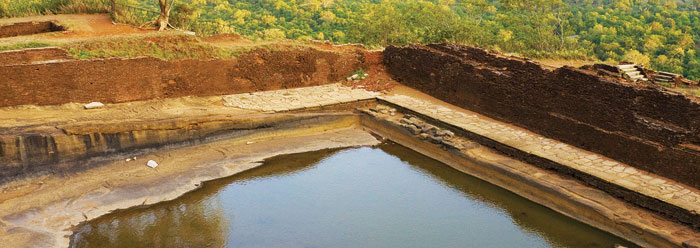 .............................................................................................................................................................
.............................................................................................................................................................
Broken Cisterns
Any cistern we create for ourselves will be a broken
cistern
BY HENRY M. MORRIS III,
D.MIN. *
“For My people have committed two evils: They have
forsaken Me, the fountain of living waters, And hewn themselves cisterns — broken
cisterns that can hold no water.” (Jeremiah 2:13)
Nearly
27 centuries ago, the prophet Jeremiah delivered God’s message of pending
judgment to the nation of Judah.
Some
150 years prior to Jeremiah’s ministry, Judah’s northern neighbor, the nation
of Israel, had been taken captive by Assyria.
Both
nations had capitulated broadly to idolatry.
Although
Judah had experienced earlier periods of revival, with the death of faithful
King Josiah it became a pagan nation, falling into gross immorality, open
political corruption, and a deplorable form of cultic Baal idolatry.
God’s
Comparison
It
is a bit difficult for us to understand the significance of the holy anger
expressed by the Lord through Jeremiah toward the nation of Judah.
Part
of that difficultly lies in our unfamiliarity with the use of “cisterns”
— particularly as God identifies Himself as a “fountain of living waters”
and condemns the pathetic attempt of the nation to build “broken cisterns”
to replace the “living waters” supplied by Jehovah.
Most
of us will remember the Lord Jesus’ interchange with the Samaritan woman
recorded in chapter four of John’s gospel.
She
had come to draw water out of a public well — Jacob’s well in this case — that
was very similar in construction to the cisterns of antiquity, which were pits
dug around a ground spring (living water) or an underground water table, then
enlarged and plastered to hold a significant quantity of water.
Most
villages and nearly all cities had such a cistern that was maintained by the
responsible government of the area and made available to the local citizens.
Some
private homeowners built private cisterns, usually on the top of their houses,
that were used to catch rainwater or to conveniently store enough for household
needs.
These
private cisterns were rarely used for drinking water since they could easily be
contaminated.
But
the “government cisterns” were constantly cleaned and routinely purged to
provide fresh “living water” for the population.
The
Samaritan woman came to the well to draw the water she needed to live.
Jesus
told her that He could give her “living water” — an internal spring of
water — that would provide eternal life (John
4:11-14; compare John 7:38).
That
is the sense in which the Lord told Jeremiah that the people of Judah had
forsaken the “fountain of living waters” and were attempting to
construct “cisterns” that would not, and indeed, could not, hold any of
the eternal water that came only from God.
Any
cistern we create for ourselves will be a broken cistern.
Rabshakeh’s
Taunt
Earlier,
during the reign of Hezekiah, Sennacherib of Assyria sent his army under
General Rabshakeh to threaten the nation of Judah.
Hezekiah
— a rare faithful king like Josiah — had recently completed the construction of
an underground water tunnel to carry a large stream of “living water”
into Jerusalem.
He “stopped the water outlet of Upper Gihon, and
brought the water by tunnel to the west side of the City of David” (2 Chronicles 32:30)
and “made a reservoir between the two walls for the water of the old pool” (Isaiah 22:11).
Thus,
the city of Jerusalem was given a secure and sanitary source of fresh water for
the needs of its population, and was prepared for an Assyrian siege should it
come.
And
come it did as the huge army under Rabshakeh arrived on the outskirts of
Jerusalem.
The
city quickly buttoned up to prepare for war, and Hezekiah sent out an envoy of
his key counselors to meet with Rabshakeh and attempt to stave off a
debilitating siege and a likely carnage.
Rabshakeh
would have no parley. Brazenly, he strode to within shouting distance of the
wall of Jerusalem (which was lined with the citizenry) and taunted them to
forget the provisions of Hezekiah and Hezekiah’s God.
That
speech promised the population of Jerusalem that if they would give up control
to Assyria, pay tribute to Sennacherib, and worship the much more powerful gods
of Assyria, they (the citizens of Jerusalem) would enjoy the benefits of a
peaceful relationship with the greatest nation on Earth.
“Do not listen to Hezekiah; for thus says the king of
Assyria: ‘Make peace with me by a present and come out to me; and every one of
you eat from his own vine and every one from his own fig tree, and every one of
you drink the waters of his own cistern.’” (2 Kings 18:31)
Revival
Came with Judah’s Refusal
Fortunately,
King Hezekiah and the nation of Judah listened to God’s prophet Isaiah and
refused the bluster and false promises of Rabshakeh.
They
trusted in the direction and counsel of God and His personal promise of
protection given through Isaiah. And God delivered.
“Therefore thus says the LORD concerning the king of
Assyria: ‘He shall not come into this city, Nor shoot an arrow there, Nor come
before it with shield, Nor build a siege mound against it.
“By the way that he came, By the same shall he return;
And he shall not come into this city,’ Says the LORD. ‘For I will defend this
city, to save it For My own sake and for My servant David’s sake.’
”And it came to pass on a certain night that the angel
of the LORD went out, and killed in the camp of the Assyrians one hundred and
eighty-five thousand; and when people arose early in the morning, there were
the corpses — all dead. (2 Kings 19:32-35)
Broken
Cisterns
Some things are fairly obvious. Anything that we do
that forsakes the living waters provided by the God of creation will fail. He
is “the way, the truth, and the life” (John 14:6).
“Nor is there salvation in any other, for there is no
other name under heaven given among men by which we must be saved” (Acts 4:12).
All
“other gospels,” no matter where or how they come, are to be totally
rejected (Galatians 1:8-9).
Most
evangelicals enthusiastically embrace an exclusive gospel that is only provided
by the grace of God given through the substitutionary death of the Lord Jesus
on the cross of Calvary and gloriously demonstrated as effective by the
physical resurrection of Jesus of Nazareth — the risen Christ is living proof
of His victory!
But
not all do so. There are “broken cisterns” being built in seminaries and
departments of religion in universities across our land.
These
man-made cisterns appear to hold water but they leak because their foundations
are not built on the Word of God.
Some
teach a universal salvation — the belief that ultimately all will be saved
because God is good and would not eternally punish His creation with an eternal
hell.
Others
promote a cooperative relationship whereby we maintain our salvation by good
works and a careful adherence to certain systems and sacraments.
Still
others propose that salvation is ushered in as mankind becomes more “godlike” —
that humanity will ultimately embrace the best of all religions and
philosophies, becoming “one” with that which offends no one.
These
various kinds of theology have one thing in common: They each turn their back
on the authority of God’s Word and the efficacy of His gospel. May God rebuke
those who teach them.
Slow-Leaking
Cisterns
There
are, however, more subtle breaks than these in the cisterns that men construct
to store the “living water” of our great God.
As
we mature in our relationship with the Lord, much of our faith is dependent on
our trust in the accuracy and authority of His revealed Word.
The
very first sin was brought about through the manipulation of Eve by the
Adversary, who deceived her into doubting what God had said.
This
then led her to entertain the thought that God either could not or would not do
as He said He would, and finally to suspect the very character and nature of
God, and even ascribe malicious and self-serving deception to the Creator in
His instructions for His creation.
Many
times, in the New Testament we are warned not to fall into the same trap of the
“broken cisterns” of man-made philosophy.
Beware
lest anyone cheat you through philosophy and empty deceit, according to the
tradition of men, according to the basic principles of the world, and not
according to Christ. (Colossians 2:8)
O
Timothy! Guard what was committed to your trust, avoiding the profane and idle
babblings and contradictions of what is falsely called knowledge — by
professing it some have strayed concerning the faith. (1 Timothy 6:20-21)
You
therefore, beloved, since you know this beforehand, beware lest you also fall
from your own steadfastness, being led away with the error of the wicked. (2 Peter 3:17)
At
the foundation of all false doctrine is the rejection of who God is.
The
classic overview that our Lord gave to the apostle Paul recorded in Romans
1:18-25 should be sufficient to focus our minds and hearts on the ultimate
problem with “broken cisterns.”
This passage makes clear that who and what God has
done is observable to everyone by “the things that are made.”
When
anyone rejects that knowledge, there is no longer any excuse.
Once the “living water” is rejected — whether
by a nation, an organization, or by an individual — any man-made cistern is
insufficient to hold the great truths of the Creator because that cistern
exchanges “the truth of God for the lie” and sets up a man-made device
that worships “the creature rather than the Creator.”
The
Scriptures are clear! “Living water” comes from God alone.
Any
cistern that we manufacture from our own knowledge or capabilities will always
be broken.
Dr. Morris is Chief Executive
Officer of the Institute for Creation Research.









